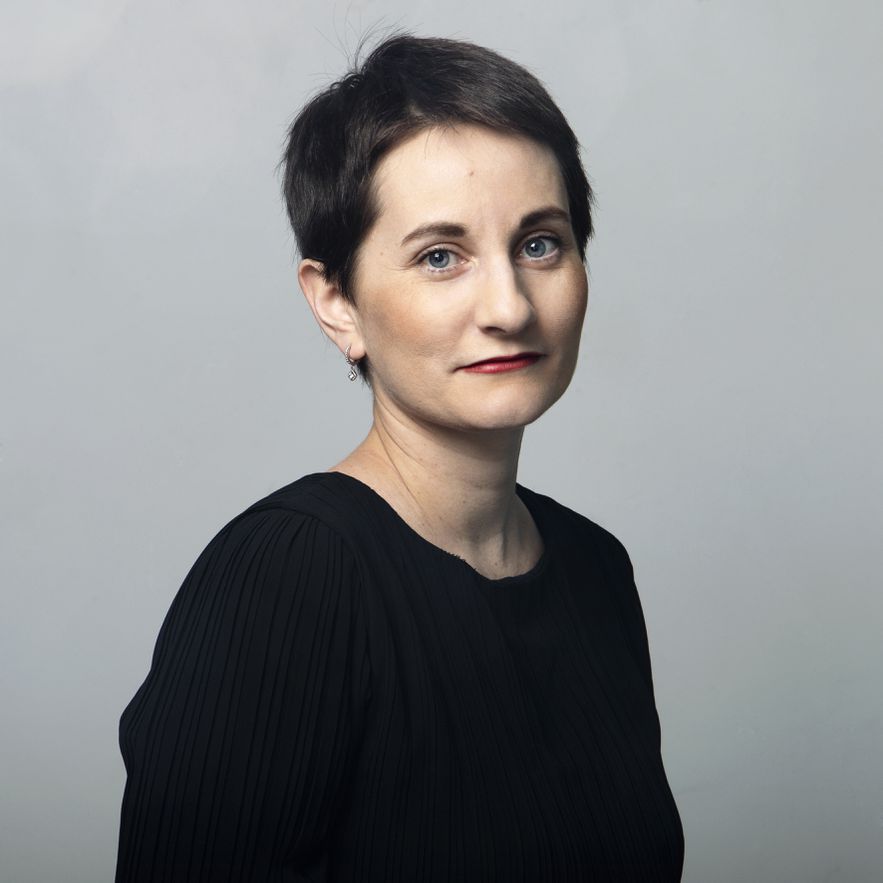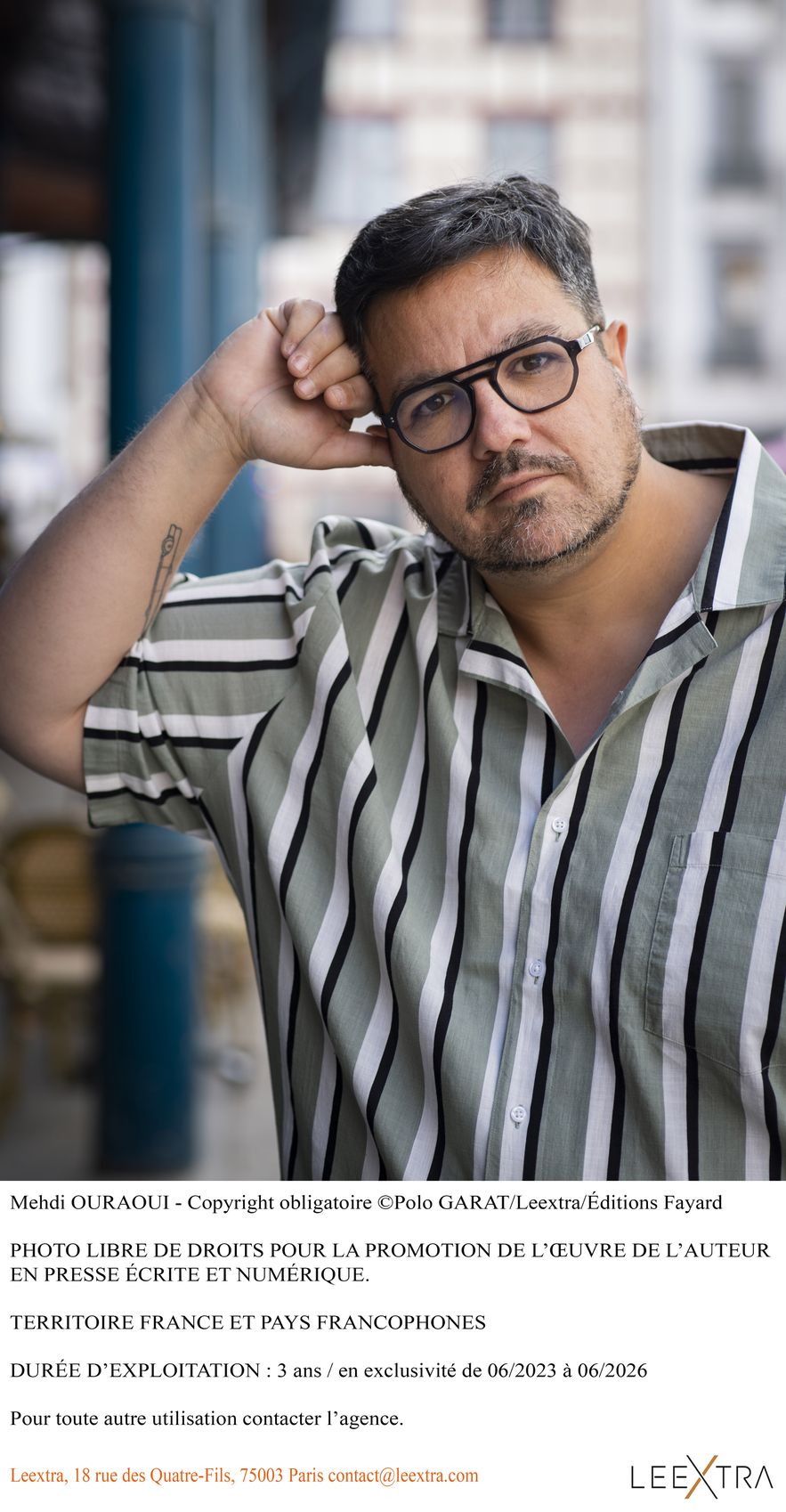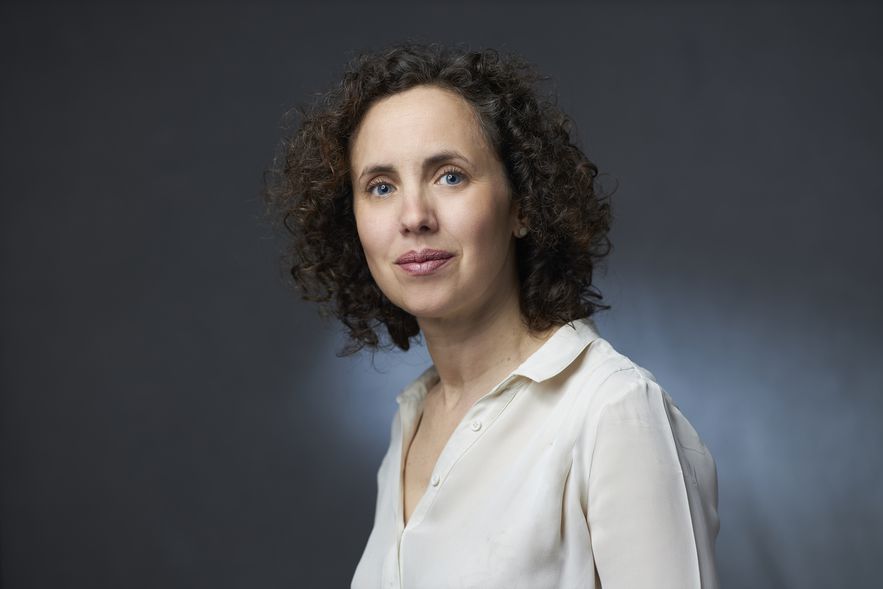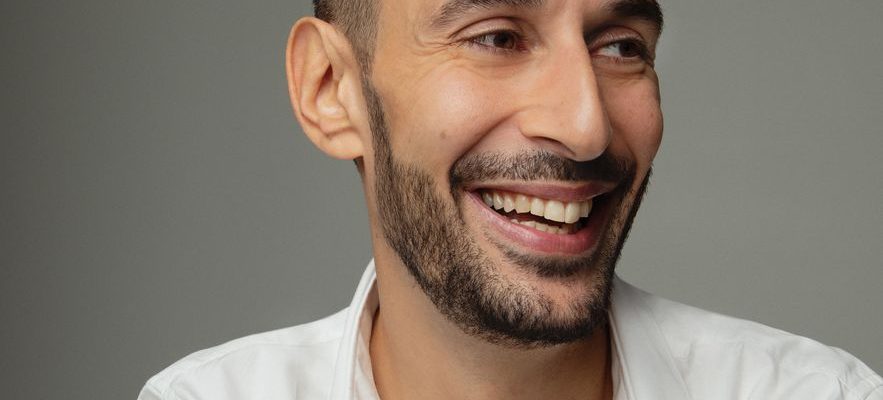They tremble, the 74 first-time novelists of this literary season. True, they have already won the first round, the publication, but now they have to distinguish themselves. To be watched and appreciated, and not only by those around them. The five authors selected at the end of July by the booksellers of the Furet du Nord/Decitre group have at least the assurance of having been read. We were convinced of this on August 28 when the jury of the Première Plume prize, of which L’Express and Crédit Agricole Nord de France are partners, debated vigorously the respective qualities of the novels by Eric Chacour, Julie Héraclès, Mehdi Ouaraoui , Panayotis Pascot and Cécile Tlili. At the end of these lively conversations emerged the winner, Eric Chacour, For what i know about you. Your turn to judge !
Eric Chacour
Tarek, doctor with a big heart
Eric Chacour
© / Justine Latour / Eds Philippe Rey
Bluffing. One could also say admirable, yes, we have rarely seen a first novel as controlled and exciting as that of Eric Chacour. In the Quebec press (what i know about you was published across the Atlantic in early January), we learn that, born in Montreal to Egyptian parents, the author, a consultant in the banking sector, took years to write his fiction. Well, everything in this story – its clever construction, its limpid writing, its confusing subject, and the endearing Levantine community of Cairo which serves as a backdrop – delights the reader.
From the opening, his interest is sharpened by this “you” used by the narrator to address the hero of the novel, Tarek, whose destiny takes shape at the age of 12. A doctor, Tarek was to be a doctor, like his father, and to the great satisfaction of his mother, the perfect representative of his Christian, bourgeois and westernized community, a sort of increasingly anachronistic “allogenous bubble” in Egypt from the 1970s to the reconquest of its Arab and Muslim identity. Very quickly, Tarek’s life was back on track, between his activities at the hospital and the clinic, and his marriage to the friendly Mira, who joined him in the large family home where Nesrine, the younger sister, and their mother who molests Fatheya, the caring servant.
The only “notch” on his marked route: the dispensary he created for the poor in the Moqattam landfill. This is where the fault will come from, or rather the deflagration, or even the “deterministic chaos” as Eric Chacour nicely writes, in the guise of Ali, a gifted young man with “absolute freedom”, that he takes under his wing and with whom he soon falls in love. The wrath of the mother, rumors in the small Levantine community, patients who cancel appointments…… Tarek casts off, flies to Montreal in 1984. Half of the novel remains, of which it would be “criminal” to reveal the content, as it would be indelicate to reveal the identity of the narrator. It is up to the reader to savor in all innocence. Marianne Payot
what i know about you, by Eric Chacour. Editions Philippe Rey, 304 pages, €22.
Julie Heracles
The shearing of Chartres

Julie Heracles – Paris – March 2023.
© / Patrice Normand / JC. slats
On August 16, 1944, Robert Capa took a historic snapshot, that of a woman, shorn, with a baby in her arms, in front of Chartres Cathedral. Historians Philippe Frétigné and Gérard Leray have investigated this 23-year-old “collaborator”, Simone Touseau, punished by the FFI and thrown into public condemnation. The Chartraine Julie Héraclès has in turn seized it. As a novelist. Slipping into the skin of Simone “l’embochée”, she gives her a new name, Grivise, and a new face. No longer that of the convinced anti-Semite, but that, in halftone, of a young and brilliant German-speaker a little exalted by the image of a strong Germany and which would have gone astray for essentially financial and romantic reasons. An ultimately very elegant way, not to clear it, but to give it its share of extenuating circumstances and thus draw a lively and nuanced portrait of an immature young woman.
A loving sister, an alcoholic and vehement mother, a faint father… such is the small family circle bordering on poverty from which Simone, raised in the best schools in the city, wishes to detach herself, driven by a blind and childish feeling of total freedom. . An upstart and revanchist – she was made pregnant and then dumped by a resistant bourgeois – the narrator is hired by the occupier as a translator. And sets his sights on a Wehrmacht officer, Otto Weiss, head of the bookstore and propaganda in the Beauceron prefecture. A good man, this Otto, who tries desperately to divert Simone from the horrors of the Third Reich. And who will pay for it with his life. PM
You don’t know anything about me by Julie Heracles. J.-C. Lattes, 384 pages, €20.90.
Mehdi Ouaroui
enchanting ghost

© / Polo Garat / Leextra / Fayard
We don’t know if the speeches of the former spokesperson for Benoît Hamon’s Génération.s movement had any salt, but there is no doubt that Mehdi Ouaroui’s first novel has some spice. Until then, the normalien had done the pen on a few essays, devoted to Nicolas Sarkozy, Marine Le Pen, Emmanuel Macron or even the future of Europe. Gear shift with my ghost, a subtle and witty fiction about the French landscape of the late 2010s. The elegance of distance and humor to evoke a host of contemporary concerns and ills such as racism, communitarianism, integration , meritocracy, education, wokism, conflicts between generations, attacks…
Or Mehdi, in his fifties, professor of Latin French at the prestigious Lycée Henri-IV, and emeritus translator of the said dead language. Still turned upside down by the separation from his wife (left with his naturopath), he met on December 24, 2018 the ghost of singer Rachid Taha on the 96 bus. A ghost who will act as his roommate for a year, but also of conscience and itchy hair, all of a sudden tasty dialogues. Very quickly, we become acquainted with the small world of Mehdi: an Arab and Muslim father, a Basque mother queen of foie gras, a son, Jalil, gone to Silicon Valley, a daughter, Norah, vegan and ecofeminist rebel, a friend, Gus, yellow vest and urban poet, a young mistress, Zélie, in her perky thirties, and a headmistress, Daphné, a “hottie” in Louboutin… So many characters that are sources of tasty episodes. Mehdi Ouraoui has the gift of making the most serious scenes cheerful, like the annual trip to Auschwitz, or the most incongruous, like the interview on Ovid of his hero by Augustin Trapenard. Better than a long speech, certainly. PM
my ghost, by Mehdi Ouraoui. Fayard, 272 pages, €19.90.
Panayotis Pascot
The heart on the shoulder

Panayotis Pascot
© / Alice Half/Stock
Of course, it helps, the “as seen on TV”. Panayotis Pascot may be only 25 years old, but it’s been seven years since this native of Saint-Etienne, raised in Essonne, showed up on the small screen with The small newspaper of Canal + then Daily from TMC. Appearances duly relayed on social networks where the columnist, humorist and actor garners subscribers (427,000 on Instagram, 313,000 on Facebook, 193,000 on Twitter) and pre-orders for his first novel, Next time you bite the dust. Hence a large print run of 25,000 copies – compared to the 2,000 to 4,000 copies used by first-time novelists. The fans of his only-in-stage, Almost, will not be distraught. We find there, with less humor, the preoccupations of the young artist, from the complexity of his family relations to the maelstrom of his sexual relations. With, as a bonus, long passages on his “obsessive thoughts” and melancholy depressions, and a confession, a suicide attempt, at 18, after “a long descent into hell”.
Panayotis Pascot is not dead, but his father, in the novel, announces to his family that he will soon die. This death, little Panayotis feared it all his childhood, today he only hopes that this deadline will finally allow the father (who has done a thousand jobs, wrestler, cultural adviser, fishmonger in real life, essayist and politician ) to drop the armor. Modesty is what characterizes this family and its imposing siblings of six children, “six heart failures”. Panayotis seems the most affected. He especially struggles to love, especially men, after the discovery, at age 19, in Montreal, of his homosexuality. Panayotis does not spare himself, who treats himself as a coward and a bastard, and shows, at 25, an astonishing sincerity and maturity. PM
Next time you bite the dust, by Panayotis Pascot. Stock, 240 pages, €19.50.
Cecile Tlili
Dinner of fools

Cecile Tlili in Paris
© / Bruno Levy / Calmann Levy
We don’t know much about Cécile Tlili (the characteristic, a priori, of first-time novelists), except that she graduated from the Ecole des Mines and after having held a high position at Engie , she co-founded an alternative school for neuro-atypical children. In short, that she made a professional 180 degree turn. Changing your life is a bit what the author ofA simple dinner seems to advocate for the two heroines of his Parisian camera.
The first is Claudia, a young and shy physiotherapist, companion of the handsome Etienne, a flamboyant intellectual and lawyer of the genre. It is with this couple, residing on boulevard Raspail in Paris, that Johar, a brilliant tech leader, must go in this hot month of August, accompanied by Rémi, her husband, a “simple” professor of economics. Claudia has spent hours perfecting her curry, Johar arrives late for dinner, she has good reasons: her president has just offered her the Grail, the upper hand in the company after the absorption of the competitor. The comedy of appearances begins, the unsaid waltz. Obviously, behind the well-distributed roles (the erased, the sparkling, the triumphant, the discreet) things are not so simplistic: Claudia is pregnant, Etienne is about to be released from his law firm in business, Johar, daughter of Tunisian bakers, seems tired of her status as a successful defector, Rémi has a young mistress… And Cécile Tlili to achieve her goals at the end of this dinner full of twists and turns: the lifting of hypocrisies and shackles societal. PM
A simple dinner, by Cécile Tlili. Calmann-Lévy, 192 pages, €18.
